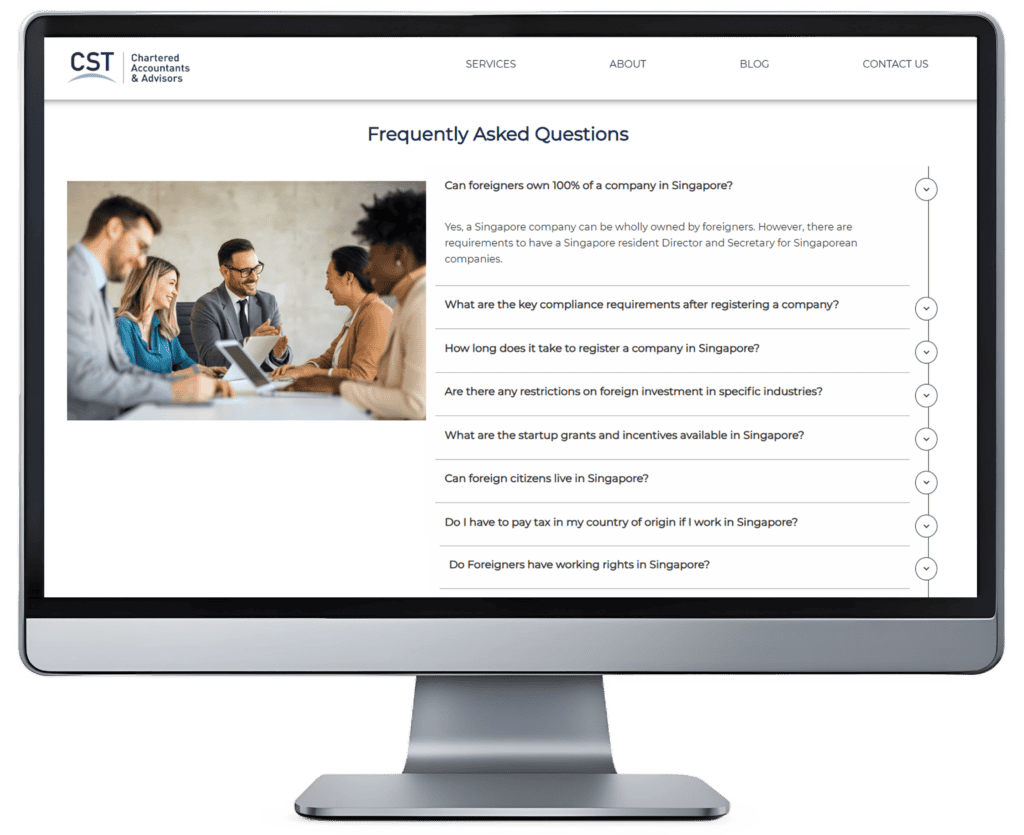Singapore is renowned for its business-friendly environment, and its Goods and Services Tax (GST) system is a key example of an indirect tax policy designed to support economic activity.
However, whilst many other jurisdictions also have this form of indirect tax, the Singapore approach does have its unique attributes to be wary of. This article outlines when and how to register for GST in Singapore, along with the specific compliance obligations foreign businesses need to meet.
Understanding GST In Singapore
GST is a broad-based consumption tax levied on the import of goods as well as nearly all supplies of goods and services in Singapore. Since 1 January 2024, the standard GST rate in Singapore is 9%. Businesses that meet certain criteria are required to register for GST and charge it on their sales, while also entitled to claim credits for GST paid on their purchases.
The following list are transactions which attract GST in Singapore:
- The supply of goods and services domestically.
- Imports of goods into Singapore.
- Online digital services. (We will consider this in detail later)
- The sale of commercial property in Singapore.
The following types of transactions are either exempt or zero-rated:
- Exempt supplies include financial services, sales and leases of residential properties, and the supply of investment precious metals.
- Zero-rated supplies include the export of goods and services – generally where the recipient of the goods or the beneficiary of the services is a non-Singaporean.
When To Register For GST
Registration for GST is mandatory for businesses with taxable turnover exceeding S$1M.
There are two test methods when it comes to determining whether a business will exceed the S$1M threshold:
- The Retrospective Method – means that you must register for GST if your taxable turnover at the end of the calendar year exceeds S$1M.
- The Prospective View – is done because you expect to exceed the S$1M threshold in the coming 12 months.
Whilst voluntary registration is possible for businesses with taxable turnover less than S$1M, it is subject to approval by IRAS, and in some cases, IRAS may request a bank guarantee as a condition of registration.
Compliance Obligations Post-Registration
Once registered, the company is required to report and file its GST return with IRAS quarterly, with lodgement due by the last day of the month following the end of a quarter (e.g., quarter ended 31 March 2025, the lodgement due date is 30 April 2025). Payment of any net GST collected is also due at this time.
Record Keeping
Businesses need to maintain meticulous records of all business transactions for at least five years. This includes tax invoices, receipts, business contracts, and other supporting documentation.
Issuance Of Tax Invoices
Whenever goods or services are supplied, a GST-registered business must issue tax invoices with all necessary details, including GST registration number, total charge, and applicable GST rate.
Specific Considerations For Foreign Entities
Reverse Charge And Overseas Vendor Registration
In 2020, Singapore introduced the reverse charge mechanism as part of its GST framework to address the increasing consumption of cross-border digital services. The objective of this framework is to level the playing field between local and overseas service providers by effectively taxing services that are consumed in Singapore.
Under this framework, the responsibility of reporting GST on imported services lies with the Singapore-based consumer. Essentially, the business receiving the service must account for the GST as if they were the supplier, thereby self-assessing and paying GST on these services.
The introduction of this framework has meant that business who frequently engaged with foreign service providers for digital services have had to review their procurement strategies.
In Summary
- The Goods and Services Tax rate is 9% and applies to goods and services provided in Singapore.
- The turnover threshold for compulsory registration is S$1M. While voluntary registration is possible, it is subject to approval from IRAS.
- Certain transactions may be exempt from GST or are zero-rated.
- When registered for GST, businesses are required to file their net GST position quarterly.
- From 1 January 2020, Singapore operates a reverse charge framework targeted at the consumption of digital assets meaning the responsibility of reporting GST on imported services lies with the Singapore-based consumer.
Understanding which transactions attract GST in Singapore is vital for both businesses and consumers. Whether you’re navigating import duties or dealing with professional service fees, grasp the fundamentals of GST compliance to enhance your competitiveness and operational efficiency in Singapore’s thriving economy.





